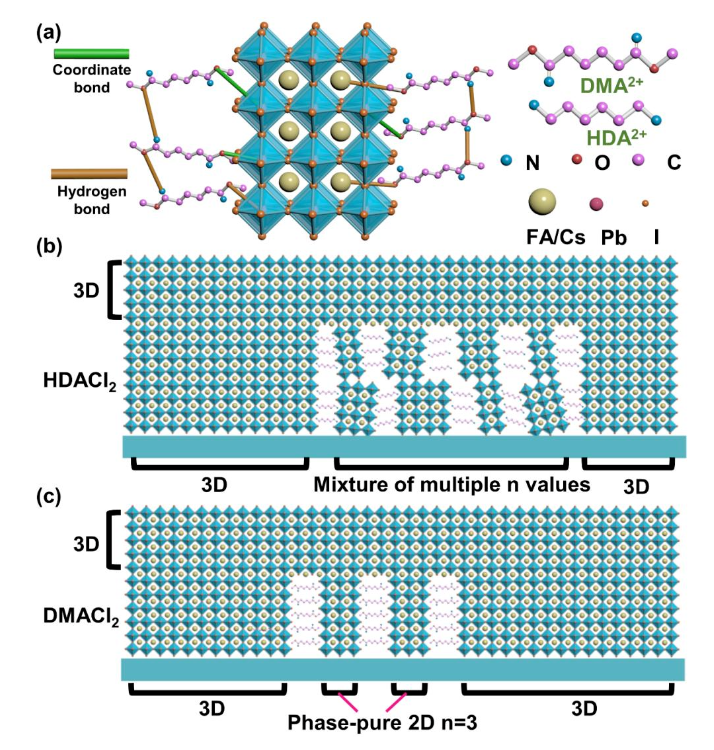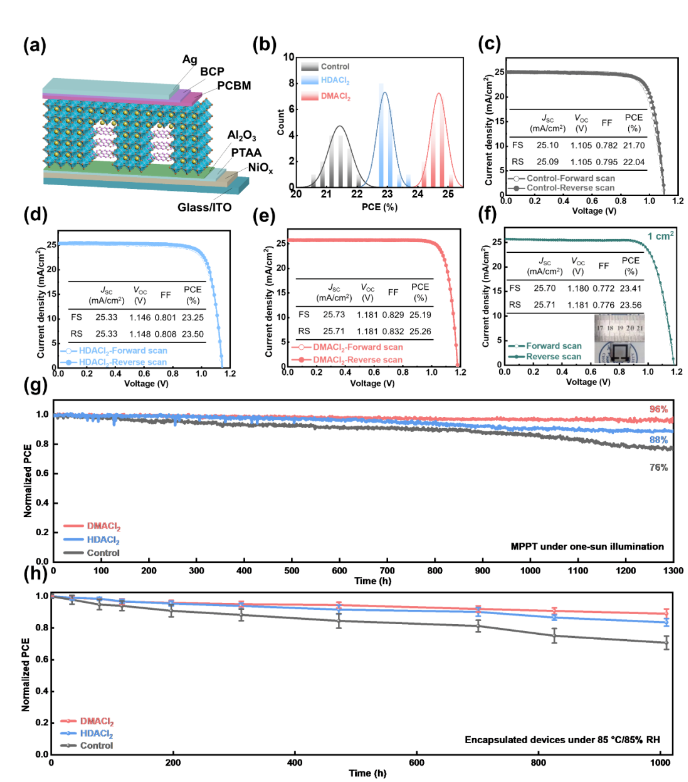昆明理工大学在反式钙钛矿太阳能电池领域取得重要进展
1月2日,昆明理工大学官网宣布,近日,昆明理工大学材料科学与工程学院陈江照团队在国际知名学术期刊Advanced Materials上以“Functional-group-induced single quantum well Dion-Jacobson 2D perovskite for efficient and stable inverted perovskite solar cells”为题发表文章。
在2D/3D钙钛矿异质结中,常常生成随机分布的多量子肼2D钙钛矿,这不利于载流子传输和结构稳定性。鉴于此,陈江照等人通过官能团诱导的纯相D-J型2D钙钛矿构筑了高质量2D/3D钙钛矿异质结。前驱体溶液中引入甲氧基促进了均一尺寸胶粒的形成,导致了纯相2D钙钛矿的形成。通过该官能团调控策略提高了三维钙钛矿结构稳定性和加速了载流子传输。改性的电池取得了25.04%的认证效率,电池在最大功率点跟踪1300小时后保持初始效率的96%,在85 °C/85% RH老化1010小时后保持初始效率的89%。
陈江照教授长期从事新能源材料与器件研究,共发表SCI论文103篇,总引用8300余次,H指数为34。
其中,以第一或通讯作者发表SCI论文81篇,包括1篇Nat. Energy、7篇Adv. Mater.、1篇Energy Environ. Sci.、1篇Angew. Chem. Int. Ed.、4篇Adv. Energy Mater.、4篇Adv. Funct. Mater.、3篇ACS Energy Lett.、1篇Nano-Micro Lett.、2篇Nano Lett.、2篇Nano Energy等,ESI高被引论文19篇,ESI热点论文4篇,单篇论文最高引用490余次,单篇引用超过100次的论文有16篇,1篇论文入选ACS Energy Letters亮点文章。申请发明专利11项,其中获授权6项。作为主编出版中文专著4部。主持国家自然科学基金面上、兵团重点领域科技攻关计划项目、重庆市自然科学基金面上、重庆市留学人员回国创业创新支持计划重点项目等科研项目8项。获得2023年全球前2%顶尖科学家、新疆天池英才特聘教授、重庆大学百人、第二届沙坪坝区十佳科技青年、2023川渝科技学术大会优秀论文特等奖、重庆市科协岗位创新争先行动三等奖、第三届川渝科技学术大会优秀论文二等奖、2022年Wiley威立中国开放科学高贡献作者奖、2022年Wiley威立中国开放科学年度作者奖等奖励与荣誉10余项。在国内外重要学术会议作邀请报告近20次。担任国际/国内学术会议大会主席(1次)、大会秘书长(1次)和分会场主席(4次)。担任Nature、Nat. Rev. Phys.、Joule等40余本国际知名学术期刊的审稿人。担任Nano-Micro Lett.、Carbon Energy、SmartMat、Nano Mater. Sci.、Sci. China-Mater.、eScience和Carbon Neutrality期刊的青年编委及先进储能材料与技术兵团重点实验室学术委员会委员。

Figure 1.a) Schematic illustration of the chemical interaction between organic spacer cations and inroganic perovskite framework.b, c) Schematic structure of the (b) DJ 2D/3D perovksite heterojunction based on HDACl2where 2D perovskites have multiple quantum wells with a random orientation and well widths and (c) DJ 2D/3D perovksite heterojunction based on DMACl2where single QW DJ 2D perovskites are formed.

Figure 2.a) Schematics of inverted PSCs based on DJ 2D/3D perovskite heterostructure.b) PCE histogram of the PSCs without and with HDACl2and DMACl2.c-f)J-Vcurves of the best performing control (c), HDACl2(d), DMACl2(e) modified devices and (f) DMACl2modified device with an active area of 1 cm2. g) PCE of the unencapsulated control, HDACl2and DMACl2modified devices measured at maximum power point under continuous one-sun illumination at 25 ± 5°Cin N2atmosphere, respectively. h) Encapsulated devices exposed to 85% RH and 85°Cin the dark.
